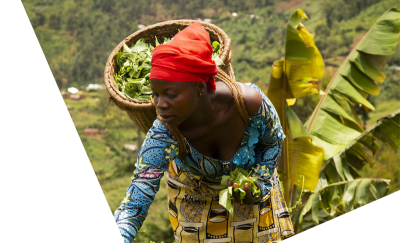From Survive to Thrive: Lessons from Resilience Building in Uganda



As the Chief of Party of the USAID/Feed the Future Integrated Community Agriculture and Nutrition (ICAN) project in Uganda, I have witnessed firsthand the immense potential of resilience building to transform livelihoods. Having worked in development for over 25 years in the ECSA region, I can attest that, unique from other approaches, a resilience perspective enables local communities to become stronger rather than merely survive.
USAID Uganda's flagship resilience program empowered thousands of households in vulnerable communities to thrive amidst inevitable shocks and stresses. Our team had the opportunity to be at the forefront to test, reflect, and learn how to build promising approaches to long-term resilience in Uganda. Our resilience efforts included improving social safety nets through group savings, increasing the adoption of climate-smart agriculture practices, and promoting dietary diversity and key WASH behaviors. Ultimately, we reached 116,000 households and 248,578 program participants, 78% of whom are female. Our success in this activity was grounded on our use of a facilitative, multi-sectoral approach, but we also tailored our responses drawing on three guiding principles:
1. A Whole-Person Approach
For program participants, we looked at the whole person, addressing not only income, but any increases in education and health outcomes. Addressing both income and health, we introduced climate-smart agriculture innovations that addressed dietary diversity and increased household incomes while mitigating the climate crisis. For example, in Karamoja, a sub-region prone to prolonged drought and natural shocks, we promoted short-maturing crops such as iron-rich beans and green grams and saw community members increase their production acreage for consumption and market. When COVID-19 became a major shock, we never would have imagined the additional benefits of our WASH interventions as the pandemic spread. In addition, ICAN's focus on building the communities' knowledge and capacities to grow and eat nutritious foods- including vegetables- addressed malnutrition, improving health outcomes of young children, pregnant and lactating mothers.


There are multiple stories of individual transformation. Agnes Nakong was one of the trainees on goat milk production and good goat management practices in Kotido district. During the training, the Business Service Provider taught community members about goat milk hygiene and safety, the benefits of goat milk, how to boost milk production, and the importance of livestock mineral/salt licks, which are artificially made blocks of salt and ash that provide animals with essential minerals that fortify their milk). Agnes' children are now healthier, and she sells surplus milk to her neighbors. Nancy Apio in Gulu district had a deep sense of hopelessness after dropping out of school at thirteen years of age when she got pregnant. She joined the USAID ICAN mentorship camps as one of over 6,000 AGYWs and gained valuable skills in knowing oneself and using her voice, which resulted in her empowerment to sign up for tailoring sessions conducted by one of her mentors; and she now runs her own tailoring school.
2. Empowering Communities
ICAN capitalized on the synergy of communities and their existing resources, key among these being their organizational structures. Through the popular "We Can Do 5" behavior change campaign, households and communities owned key messages that encouraged families to:
- Eat a diverse diet year-round
- Send their children to school
- Participate in community dialogues
- Saving with a purpose, and
- Adopt latrines, handwashing facilities, water harvesting and improved natural resources management to improve both health and produce
More than 200 communities became model villages, meaning that 80 percent of households are implementing and committed to the five behaviors.
3. Creating an Enabling Environment
Our greatest success was creating an enabling environment for change, including the local government buy-in and involvement of the private sector to build the communities' resilience. Strengthening local and community governance was a pillar of this project. We partnered with local actors to help households diversify their income and nurture entrepreneurial capacities, promote mothers' and children's health, and boost school enrollment and retention. We learned that for resilient behaviors to gain traction, they need reinforcement from respected peers and local authority figures.


ICAN’s facilitative approach leaned into that truism; we worked through local governments, community leaders, and groups to provide services. We supported district governments to develop disaster management plans, helped community groups establish contextual processes through resilience committees, and identified governance champions to encourage community participation.
What Comes Next:
One of the things I am most proud of, is that our work is continuing even after the project's completion. Our local implementing partners have taken the ICAN experience and leveraged it for other opportunities to promote food security, enhance natural resource management practices, and reduce human-wildlife conflict. Many business service providers continue to work with private companies to offer basic agronomic extension services. These linkages have offered new buyers for previously marginalized farmers.
To assess the likelihood that USAID ICAN will have a sustained impact, we conducted an analysis towards the end of the project. We found that integrating interventions from across these key sectors and empowering people with knowledge and skills dramatically improves the chances that people will retain resilient behaviors in the future. All of this ratifies Abt's belief that solutions must be tailored to local contexts and that equity must be at the heart of those solutions. By working within existing systems and cultural contexts to build local capacity and, confront gender and power imbalances, we can ensure that communities and the most vulnerable are agents of their own change, are able to build the community-led resilience they need to thrive.
Read More

The 29th Conference of the Parties to the United Nations Framework Convention on Climate Change (COP29)
Abt will join governments, the private sector, and civil society at the 29th Conference of the Parties to the United Nations Framework Convention on Climate Change (COP29) this November to accelerate climate action.

Market Systems Symposium (MSS) 2024
Abt Global is sponsoring and presenting at Market Systems Symposium (MSS) 2024 in October 2024.

Corporate Newsletter – May 2024
Discover our impact on global issues and innovative solutions. Dive into Abt's latest feature stories, blogs, webinars, and more!
